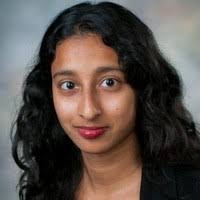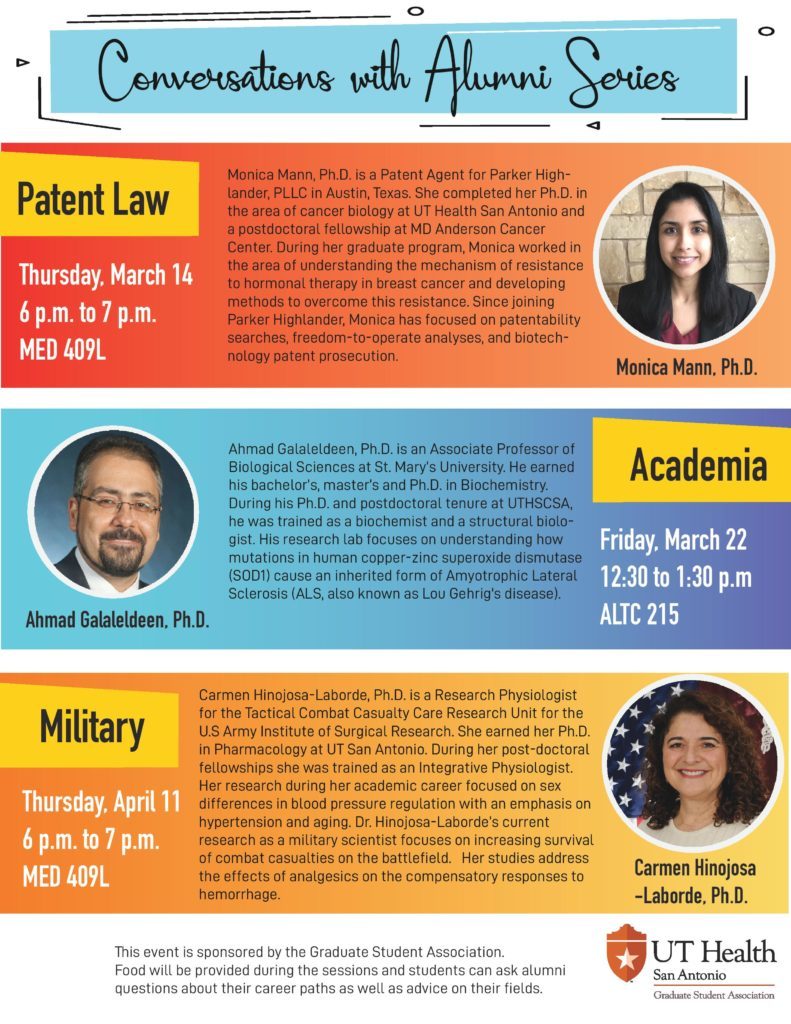Conversations with Alumni Series: Dr. Monica Mann, Life As A Patent Agent
Alumna Dr. Monica Mann returned to campus on March 14 to speak at March’s Conversations with Alumni Series hosted by the Graduate Student Association where she spoke about her career as a patent agent at Parker Higherlander, PLLC in Austin, Texas.
She completed her Ph.D. in the area of cancer biology five years ago at UT Health San Antonio. During her graduate program, Monica worked in the area of understanding the mechanism of resistance to hormonal therapy in breast cancer and developing methods to overcome this resistance.
Afterwards, she completed a postdoctoral fellowship at MD Anderson Cancer Center.
“I didn’t feel like I wanted to be in research because I didn’t want to have my own lab and apply for grants,” she explained to graduate students. “When my now-current boss gave a talk at MD Anderson Cancer Center about patent law, I was interested and he also mentioned they had a patent agent position available.”
Dr. Mann explains that in patent law there are typically two types of firms—small and large.
“The smaller firms are considered boutique firms like mine which focuses just on biotechnology and medical devices whereas larger firms can be based in multiple locations and also have multiple areas of expertise.”
 While one might think that you need a law degree to be a patent agent, Dr. Mann explained that typically they are looking for someone in the field so for her firm, they are looking for someone with a science background. She also explained that there is a distinction between a patent agent and a patent attorney.
While one might think that you need a law degree to be a patent agent, Dr. Mann explained that typically they are looking for someone in the field so for her firm, they are looking for someone with a science background. She also explained that there is a distinction between a patent agent and a patent attorney.
“A patent agent usually is hired right out of graduate school and you will spend most of your day drafting applications whereas a patent attorney went to both graduate school and law school. The attorneys will usually work on oppositions, opinions, or responses to office actions.”
 After learning about the job opportunity, Dr. Mann was accepted as an intern where she worked on projects and then the company paid for her patent exam, books, and registration to become a licensed patent agent.
After learning about the job opportunity, Dr. Mann was accepted as an intern where she worked on projects and then the company paid for her patent exam, books, and registration to become a licensed patent agent.
“The test is around 100 questions and it’s open book but you really need to study because you need to be able to find the right chapter and section for the answers,” she said. “The pass rate is around 45 percent so having experience really helps.”
One aspect that Dr. Mann enjoys about her job is the variety of science in the cases that she works on.
“When I first started, I really didn’t know much about immunology beyond the one course that I had taken but now I’ve become an immunology expert in the office because we’ve had so many immunology-focused applications.”
Dr. Mann explained that for graduate students looking to get in the field, having experience writing grants will help. Dr. Mann certainly had experience having applied and obtained an individual National Research Service Award (F31 predoctoral fellowhip) from NIH/NCI while a graduate student here at UT Health.
“The difference with grant applications is that you typically have months to work on it while we have days so the turnaround is pretty quick but you really need to have strong writing skills so my experience in graduate school helped tremendously.”
Join us next month for the next Conversations with Alumni Series!
 This article was written by Charlotte Anthony, marketing specialist at the Graduate School of Biomedical Sciences at UT Health San Antonio.
This article was written by Charlotte Anthony, marketing specialist at the Graduate School of Biomedical Sciences at UT Health San Antonio.



